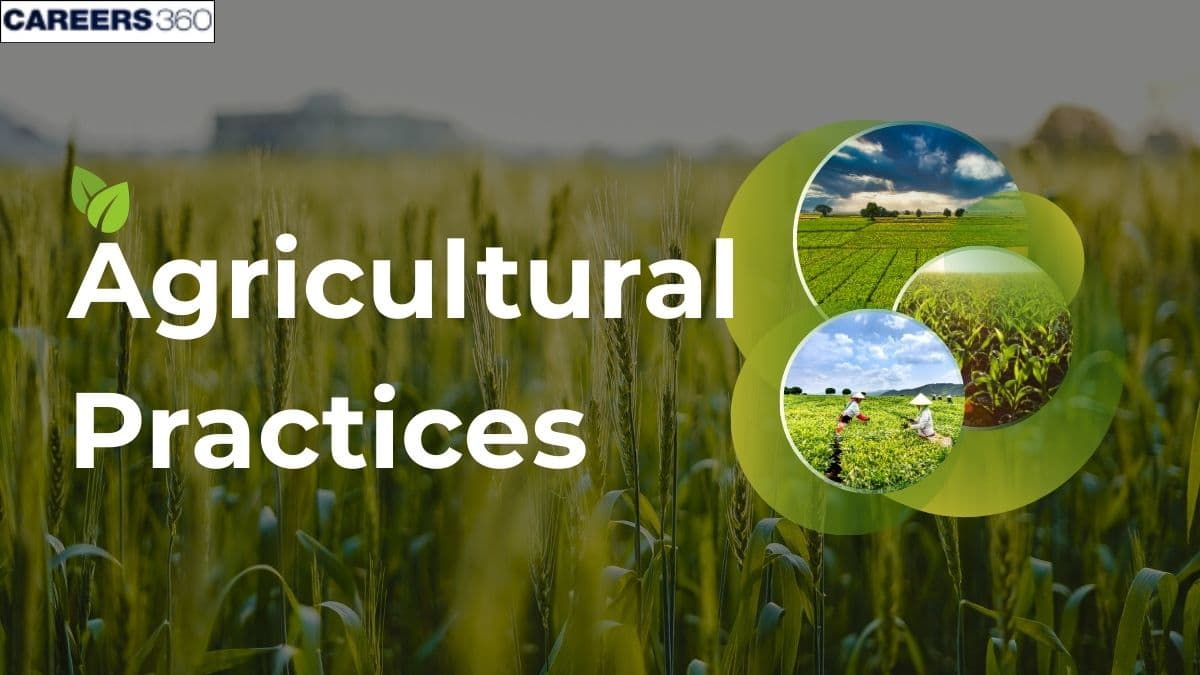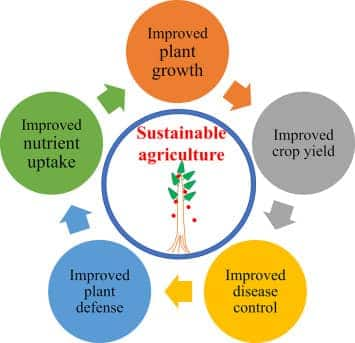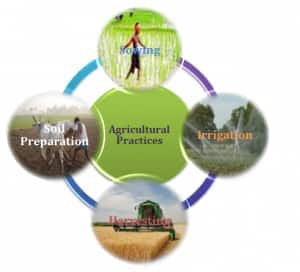Agriculture Agricultural Practices: Overview, Organic Farming, Irrigation
Agricultural practices include the essential steps involved in cultivating crops, such as soil preparation, sowing, irrigation, weeding, harvesting, and storage. Agricultural practices are the only reason for high production of crops and we can meet the demand of the growing population. Due to good agricultural practice, there is also good quality of crops produced. These include the basic practices of crop production, which ensure efficiency and sustainability in farming.
This Story also Contains
- What are Agricultural Practices?
- Major Agricultural Practices
- Most Common Agricultural Practices
- Importance of Sustainable Agricultural Practice
- Tips, Tricks, and Strategies for Agricultural Practices
- Types of Questions Asked from Agricultural Practices
- MCQs on Agricultural Practice
- Frequently Asked Questions (FAQs)

Modern agricultural techniques, when combined biotechnology, have revolutionized traditional farming by improving crop yield, resistance to pests, and tolerance to environmental stresses. These practices play a key role in sustainable development. Furthermore, combining ecological balance and ecosystem preservation into agriculture is vital for long-term productivity and environmental health.
What are Agricultural Practices?
The techniques and tactics that farmers use to cultivate crops and produce livestock are known as agricultural practices. The techniques vary depending upon the resources available, soil types, and the environment. Some of the major importance of agriculture practices are discussed below:
Agriculture practices techniques like crop rotation and organic fertilizers increase the fertility as well as nutrients of the soil.
Techniques like soil preparation, use of green manure and organic farming increase productivity and also conserve minerals at the same time.
For better agriculture practices there are also best management and timely crop rotation techniques available which help you control the pests, weeds and your crops from several diseases.
Some modern methods like drip irrigation and conservation tillage can also help in providing sufficient water and reduce the environmental damage which is done due to normal agricultural methods.
Proper agriculture techniques help in maintaining the environmental balance and reduce the ecological footprint in the maintenance of biodiversity.
Major Agricultural Practices
Soil Preparation
Crop cultivation begins with the preparation of the soil. The soil must be ploughed evenly and levelled. A good agricultural fertilizer should be used in order to enrich with nutrients.
Sowing
Selection of Superior seeds is sown for better production of crops. Drilling and broadcasting are some of the agriculture implements that help increase the production of your crop and these are used very commonly.
Irrigation
Crop growth requires appropriate water management. Techniques like drip irrigation and sprinkler irrigation ensure appropriate soil moisture while preserving water. Crops must have and water availability impact irrigation techniques.
Weeding
Removing unwanted plants that compete with crops for sunlight and nourishment needs weeding. Chemical and mechanical techniques are used to get rid of weeds.
Protection of crops
Herbicides and pesticides are put to use by farmers to protect their crops from diseases and pests. However, overuse of chemicals can harm aquatic ecosystems by leading to eutrophication, and contamination of nutrients in water bodies.
Harvesting
Once the crop is ready the process of harvesting begins. The grains are collected and the residue is used for the generation of biofuel.
Storage
Once the crops are harvested and collected they need to be stored at safe temperatures and environment for long periods of time. This process is also for the protection of crops from pests and rodents.
Most Common Agricultural Practices
Some of the common agricultural practices include soil preparation, sowing of seeds, application of manure and fertilizers, irrigation, weeding, and harvesting. These steps are essential for healthy crop growth and high yield. Each practice plays a crucial role in the overall success of crop production of the common agricultural practices.
Types of Agriculture Practices | Explanation |
Shifting agriculture |
|
Intensive farming |
|
Plantation agriculture |
|
Mixed farming |
|
Importance of Sustainable Agricultural Practice
A sustainable agriculture practice is a balance towards good food production with the preservation of the environment and ecosystem at the same time. By adopting good agriculture practices methods you can save the soil from problems like soil degradation, water scarcity and excessive use of chemical fertilizers.
Apart from this a sustainable and organic agriculture practice also helps in promoting the balance between biodiversity by maintaining crop rotation and natural ecosystems. It also saves aquatic ecosystems from the harmful chemicals which are used in pesticides and fertilizers.

Tips, Tricks, and Strategies for Agricultural Practices
It takes effort to remember everything in a single go. We made the entire problem easy. Some of the tricks regarding Agricultural Practices are given below which you can use to memorise the important points.
Getting the Soil Ready "PAL: Plowing, Aeration, Leveling"
P: Plowing, which digs up the soil in preparation for planting
A: Aeration, which allows nutrients and air to reach roots
L: Leveling ( soil leveling for better irrigation)
Methods of Sowing
"BDS: Broadcasting, Drilling, Sowing Depth"
B: Broadcasting (that is, the seeds over a broad region)
D: Drilling, which includes planting seeds at specific depths
S: Planting seeds at the right level for germination is known as "sowing depth."
Methods of Irrigation "SDF: Sprinkler, Drip, Flood"
S: Sprinkler (rain-like spraying of water on crops)
D: Drip (to save water, water goes straight to the roots)
F: Flood (also known as the traditional method of pouring water onto fields)
Types of Questions Asked from Agricultural Practices
During exam preparation, different types of questions about Agricultural Practices are asked. The table below contains the different patterns of questions asked in different exams.
Exam Type | Types of Questions Asked | Weightage |
| 2% | |
| 3% | |
Paramedical |
| 4% |
MCQs on Agricultural Practice
Q1. Which of the following is a method of crop improvement that involves growing two or more crops simultaneously on the same field?
A. Crop rotation
B. Intercropping
C. Monoculture
D. Mixed farming
Correct answer: B. Intercropping
Explanation:
Intercropping is an agricultural practice where two or more crops are grown simultaneously on the same field in a definite pattern. This method helps in efficient use of resources, prevents pests and diseases, and improves soil fertility. It is different from crop rotation, where crops are grown alternately in different seasons.
Q2. Which of the following is a biological method of pest control in agriculture?
A. Use of weedicides
B. Crop rotation
C. Spraying DDT
D. Releasing ladybird beetles to control aphids
Correct answer: D. Releasing ladybird beetles to control aphids
Explanation:
Using natural predators like ladybird beetles to control harmful pests like aphids is a form of biological control. This eco-friendly method helps reduce the use of chemical pesticides, preserving the environment and maintaining ecological balance. Options like weedicides and DDT involve chemicals, while crop rotation is a cultural practice.
Also Read
Frequently Asked Questions (FAQs)
Q1. What are the agriculture practices?
Agricultural practices refer to the steps involved in crop production and management, such as soil preparation, sowing, irrigation, weeding, harvesting, and storage. These practices aim to improve crop yield and quality.
Q2. What are the four types of farming?
The four main types of farming are subsistence farming, commercial farming, plantation farming, and mixed farming. Each type varies based on scale, technology, and purpose.
Q3. Why is agriculture practice not similar everywhere in the world?
Agricultural practices differ due to variations in climate, soil type, technology availability, cultural habits, and economic conditions in different regions.
Q4. What are the factors that affect agricultural practices around the world?
Climate, soil fertility, topography, water availability, market demand, and access to technology are key factors that influence agricultural practices globally.
Q5. Which is the main problem of world agriculture?
The main problem in world agriculture is food insecurity caused by population growth, land degradation, limited resources, and climate change.
Frequently Asked Questions (FAQs)
Agriculture has a wide range of effects on society, including supporting livelihoods through food, habitat, and employment; providing raw materials for food and other products; and fostering strong economies through trade. The Balance Small Business is the source.
Soil preparation, sowing, manure and fertiliser addition, irrigation, harvesting, and storage are the main steps in agricultural practices.
Agriculture is a late Middle English adaptation of Latin agricultura, derived from ager 'field' and cultra 'cultivation' or 'growing'. While agriculture is typically associated with human activities, certain ant, termite, and beetle species have been cultivating crops for up to 60 million years.
Norman Ernest Borlaug (March 25, 1914 – September 12, 2009) was a humanitarian and agricultural scientist from the United States. Some consider him the "Father of Modern Agriculture" and the Green Revolution.
Agriculture is classified into four types: shifting cultivation, subsistence farming, pastoralism, and intensive farming. Agriculture, despite its variable nature, is the most widespread activity.
